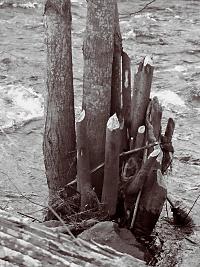|
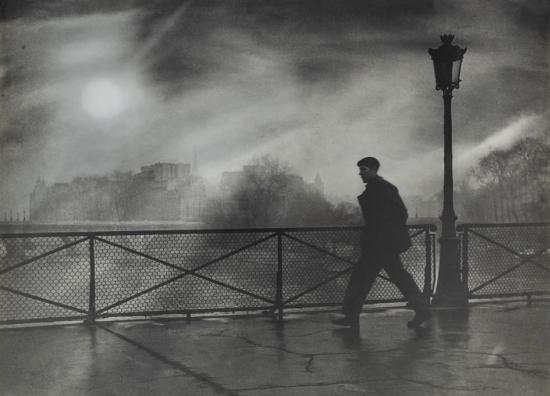
Le passant du Pont des Arts
Édith Gérin
(1910-1997)
_______________________
The Bridges
Ingeborg Bachmann
Translated by Peter Filkins
(....)
Lonely are all bridges,
and fame is as dangerous for them
as it is for us, yet we presume
to feel the tread of stars
upon our shoulders.
Still, over the slope of transience
no dream arches us.
It’s better to follow the riverbanks,
crossing from one to another,
and all day keep an eye out
for the official to cut the ribbon.
For when he does, he’ll seize the sun’s scissors
within the fog, and if the sun blinds him,
he’ll be swallowed by fog when he falls.
...(more)
Two Poems by Ingeborg Bachmann
Translated by Peter Filkins
_______________________
The Two Kings and the Two Labyrinths
Jorge Luis Borges
It is said by men worthy of belief (though Allah’s knowledge is greater) that in the first days there was a king of the isles of Babylonia who called together his architects and his priests and bade them build him a labyrinth so confused and so subtle that the most prudent men would not venture to enter it, and those who did would lose their way.
...(more)
via Mitsu Hadeishisynthetic zero
_______________________

puritain place
1960
Harold Town
b. June 13, 1924
_______________________
Digital Humanities and the End of (Close) Reading:
A Review of Franco Moretti’s Distant Reading
Daniel Moore
Toronto Review of Books
(....)
Distant Reading confirms Moretti’s penchant for playing devil’s advocate, a role that has brought him as close to notorious stardom as his discipline allows. He has been called a true innovator in literary studies, a “great iconoclast of literary criticism,” and maybe not a literary critic at all. (The first opinion is an economist’s; the other two both come from a review of Moretti’s Graphs, Maps, Trees: Abstract Models for a Literary Theory.) Reading Moretti thus tends to raise a question, one that often attends the work of mavericks, about where showmanship gives way to brilliance expressed with uncommon candour. But in Distant Reading Moretti frustrates the iconoclast-charlatan binary by inhabiting both poses at once ...(more)
_______________________
Five poems from "Irish Poetry 600-1200"
(a work in progress)
Geoffrey Squires
presented by Jerome Rothenberg
5
A bank of trees overlooking me
and
how could I fail to mention this
a blackbird composing an ode for me
above my book the lined one
here in the glade
the chatter of birds birdsong
a clear-voiced cuckoo in a grey mantle
sings to me
making a fine speech
from the top of a bush-fort
truly the Lord is good to me
I write well in the wood
...(more)
_______________________
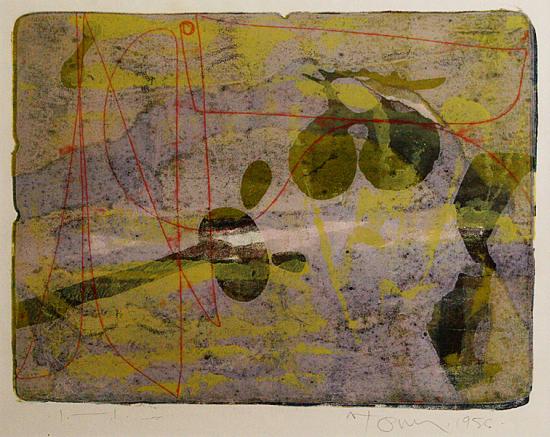
Untitled
(A Walk In Wychwood Park)
Harold Town
1956
_______________________
new poems
Craig Hickman
alien ecologies
The Art of Trees
Craig Hickman
When words
no longer have
the means to say
what we believe,
when doubt and force
bring on the mind’s dis-ease
(superficial conversation
passing for the truth that is,
mouthing only lies that
catch us gazing into night),
then we, who are
the party of this dream,
this hope, begin
to know and see
by questioning the art of trees;
by walking alone, together
among the darkened leaves,
where thoughts like tears
begin to shed their fears
and follow us along the road
where children of the forest
still wander from our thoughts
like so many butterflies, free and alive.
_______________________
Stirrings still
Samuel Beckett
One night as he sat at his table head on hands he saw himself rise and go. One night or day. For when his own light went out he was not left in the dark. Light of a kind came from the one high window. Under it still the stool on which till he could or would no more he used to mount to see the sky. Why he did not crane out to see what lay beneath was perhaps because the window was not made to open or because he could or would not open it. Perhaps he knew only too well what lay beneath and did not wish to see it again. So he would simply stand there high above the earth and see through the clouded pane the cloudless sky. Its faint unchanging light unlike any light he could remember from the days and nights when day followed hard on night and night on day. This outer light then when his own went out became his only light till it in its turn went out and left him in the dark. Till it in its turn went out.
One night or day then as he sat as his table head on hands he saw himself rise and go. First rise and stand clinging to the table.Then sit again. Then rise again and stand clinging to the table again. Then go. Start to go. On unseen feet start to go. So slow that only change of place to show he went. As when he disappeared only to reappear later at another place again. Then disappeared only to reappear later at another place again. So again and again disappeared again to reappear again at another place again. Another place in the place where he sat at his table head on hands. The same place and table as when Darly for example died and left him. As when others too in their turn before and since. As when others would too in their turn and leave him till he too in his turn. Head on hands half hoping when he disappeared again that he would not reappear again and half fearing that he would not. Or merely wondering. Or merely waiting. Waiting to see if he would or would not. Leave him or not alone again waiting for nothing again.
Seen always from behind withersoever he went. Same hat and coat as of old when he walked the roads. The back roads. Now as one in a strange place seeking the way out. In the dark. In a strange place blindly in the dark of night or day seeking the way out. To the roads. The back roads.
A clock afar struck the hours and half-hours. The same as when among others Darly once died and left him. Strokes now clear as if carried by a wind now faint on the still air. Cries afar now faint now clear. Head on hands half hoping when the hour struck that the half-hour would not and half fearing that it would not. Similarly when the half-hour struck. Similarly when the cries a moment ceased. Or merely wondering. Or merely waiting. Waiting to hear.
There had been a time he would sometimes lift his head enough to see his hands. What of them was to be seen. One laid on the table and the other on the one. At rest after all they did. Lift his past head a moment to see his past hands. Then lay it back on them to rest it too. After all it did.
The same place as when left day after day for the roads. The back roads. Returned to night after night. Paced from wall to wall in the dark. The then fleeting dark of night. Now as if strange to him seen to rise and go. Disappear and reappear at another place again. Or the same. Nothing to show not the same. No wall toward which or further from. In the same place as when paced from wall to wall all places as the same. Or in another. Nothing to show not another. Where never. Rise and go in the same place as ever. Disappear and reappear in another where never. Nothing to show not another where never. Nothing but the strokes. The cries. The same as ever.
Till so many strokes and cries since he was last seen that perhaps he would not be seen again. Then so many cries since the strokes were last heard that perhaps they would not be heard again. Then such silence since the cries were last heard that perhaps even they would not be heard again. Perhaps thus the end. Unless no more than a mere lull. Then all as before. The strokes and cries as before and he as before now there now gone now there again now gone again. Then the lull again. Then all as before again. So again and again. And patience till the one true end to time and grief and self and second self his own.
...(more)
_______________________
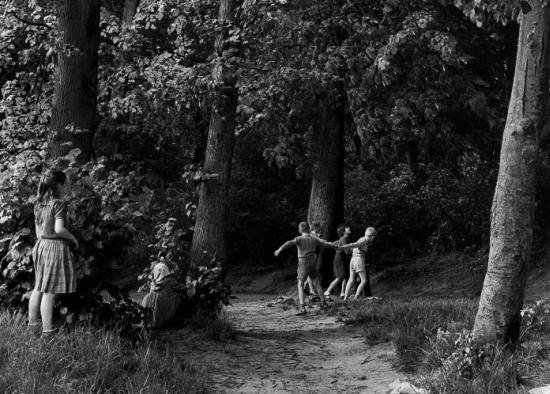
Recess time in the woods
Janine Niépce
1921 - 2007
Taking a break - the "s lot" will resume early August - mw
_______________________
from “Company”
Samuel Beckett
(....)
Your mind never active at any time is now even less than ever so. This is the type of assertion he does not question. You saw the light on such and such a day and your mind never active at any time is now even less than ever so. Yet a certain activity of mind however slight is a necessary adjunct of company. That is why the voice does not say You are on your back in the dark and have no mental activity of any kind. The voice alone is I company but not enough. Its effect on the hearer is a necessary complement. Were it only to kindle in his mind the state of faint uncertainty and embarrassment mentioned above. But company apart this effect is clearly necessary. For were he merely to hear the voice and it to have no more effect on him than speech in Bantu or in Erse then might it not as well cease? Unless its object be by mere sound to plague one in need of silence. Or of course unless as above surmised directed at an other.(....)
In another dark or in the same another devising it all for company. This at first sight seems clear. But as the eye dwells it grows obscure. Indeed the longer the eye dwells the obscurer it grows. Till the eye closes and feed from pore the mind inquires, What does this mean? What finally does this mean that at first sight semmed clear? Till it the mind too closes as it were. As the window might close of a dark empty room. The single window giving out on outer dark. Then nothing more. No. Unhappily no. Pangs of faint light and stirrings still. Unformulable gropings of the mind. Unstillable.
…
For why not? Why in another dark or in the same? And whose voice asking this? Who asks, whose voice asking this? And answers, His soever who devises it all. In the same dark as his creator or in another. For company. Who asks in the end, Who asks? And in the end answers as above? And adds long after to himself, Unless another still. Nowhere to be found. Nowhere to be sought. The unthinkable last of all. Unnameable. Last person. I. Quick leave him....(more)

James McNeill Whistler
_______________________
a visitor in the night
Extracts from Journal of a dead man
Marcel Béalu
Translated by Andrew Robert Hodgson
3:am
I can’t sleep anymore. I’ve called off the search. All evening, buried in my armchair I’ve sat and waited for the waves to take me. But as they started to reach the walls, as the eddies took up the things in my room, a frogman slowly opened the door. Green water rushed in and over his heavy form, ran over the carpet, raced up towards the ceiling. He walked towards me clumsily as if at the bottom of the ocean. Then, taking off his glove, he placed on my table a pebble. A phosphorescent pebble glinting in the shadow growing thicker. I could no longer see the diver after that. Just in the middle of the night this white pebble.
Sometimes my night-time visitor comes without his diving suit. The sight is terrifying. On such evenings he puts under my eyes a book always opened to exactly the same page. The book is a diary covered in black canvas like they use commercially and the page is that day. The last time I read it was Monday 28th April, the day of Saint Aimé. On that day I hadn’t loved anyone. Under the day’s appellation there was nothing, the page was a desert of pure white. More often than not the pages are blank like that. That night I whispered under my breath, I pleaded with him: I’m dead, I’m dead aren’t I? And as soon as I uttered these words the diver tore out the page and disappeared with the book. But his gaze, the intolerable weight of his gaze lingered before me to the end of the night.
On other nights I see on the page a mess of hieroglyphs in red ink. I look across the incomprehensible signs until they dissolve and flow together as nets of blood. The page then takes on the look of turned out skin, overly neat, clean, or a map of the rivers, waterways and canals of some unknown country.
Other times still there moving on the page like on a cinema screen but with extraordinary photographic perfection, octopi or water lilies. Sometimes simply scenes from my day; but I never recognise the beings that surround me.
...(more)
_______________________
Simon Perchik: New Poems
exquisite corpse
Not yet certain, half stone
half held back -wave after wave
rattles it, makes it start over
louder, distracted by the sound
that is not your shoulders
gathering around this grave
no longer facing the fragrance
riverbeds become once they dry
by calling out to each other
clog your mouth with salt and nearby
-what you hear is edging closer
has doubts, lost count
the way these rocks are winded
and one by one broken up
as flowers and your arms. ...(more)
Simon Perchik1 2 3 4 5 6 7
_______________________
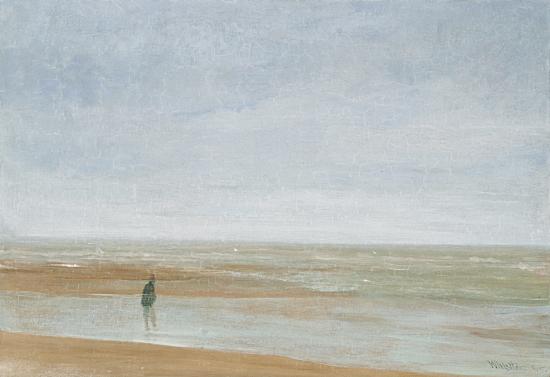
Sea and Rain
1865
James McNeill Whistler
b. July 10, 1834
_______________________
Echo's Bones cannot be read alone. A massive in-joke for anyone who's read More Pricks Than Kicks, the slim volume's best concordance is not the notes that decipher the text's extensive references, but the preceding collection; don't attempt Echo's Bones without it.
More Chicks and DicksJoanna Walsh berfrois
The first time I read More Pricks Than Kicks I was assailed by terrible cramps that rippled up and down the front of my torso until I stopped reading. It seemed appropriate. Echo’s Bones is a long short story originally intended as the ‘recessional’ to More Pricks Than Kicks, Beckett’s 1934 collection of stories about Belacqua – Dubliner, eternal student, abject sufferer from his own body: goitre, hammer toe, sexual dysfunction and moral turpitude. Although Beckett had to be persuaded to write the story in order to flesh out the collection, Echo’s Bones gave Shatton & Windup “the jim-jams” and it was rejected. Now here it is, resurrected and larger-than-life, bulked-out by an introduction and notes longer than the text itself.
The beautiful new Faber edition (taking notes, my pencil sunk into what must truly be the Andrex of paper stock) is annotated almost out of existence, making the task of reading nearly as great a labour as digging up your own coffin, as Belacqua (now deceased), finds.
There is much to annotate. ...(more)
_______________________
To calibrate this stone
you break the sun just so
part shoreline, part darkness
where the Earth survives
by holding on to your shadow
as if it had no mouth
and what you hear are seabirds
covered with cries that circle
as rain and dust and nightfall
—it's an ancient gesture
half salt, half waves
and nothing inside the stone
that can reach so far
yet you let it drop
with an undisguised precision
that blows open your fingers
and one stone toward another
that is not the sea
not the grass among these flowers
nothing, not the overcast all night
falling from some woman's dress
and you can't hear it raining.
Simon Perchik
Simon Perchik : eight poemsjacket_______________________

Village at the Water's Edge
1910
Roger de La Fresnaye
b. July 11, 1885
_______________________
Pierre Alferi
I write poetry when I cannot make sense of my present predicament. The process is one of clinging to scarce fragments floating around me and tying them together to avoid drowning.
On “Translating the Untranslatable”: Conversations with French Poets Anne Portugal and Pierre Alferi
Anne Portugal
Participating in translating my work with my translators has always been a wonderful and funny linguistic adventure. Of the many examples, consider the way Rosmarie Waldrop translated the poem “Voyer en l’air” in Quisite Moment. In French, this book is already composed as a sort of riddle, where cutting a banal word begets a new one. So the trick is to simultaneously keep the joke in French and re-create it in English. Here are some titles, for example: “den gust of fresh air,” “mantic evening,” “mendous news,” or “able legs.” I also remember Jean-Jacques Poucel’s difficulty in translating the pronouns and possessive adjectives in Formula Flirt from the very long and complex French syntax and to distinguish those designating “he” and “she” (the two lovers in the book) from those that were more deictic. From one language to another, the major difference is always in the designation of plants and flowers. For example, in La formule flirt, one poem is about the notion of being constrained, as in a jail, so un if in French is perfect for its slimness and idea of sorrow, but in English the choice between “cypress” and a “yee” and other sorts of conifers leads to interminable hesitations. Finally, I can’t forget my experience when, at the Hakiyoshidai International Center in Japan, a group translating “Le plus simple appareil” into Japanese had to find an equivalent of the French word “magnolia,” then ten Japanese poets around the table proposed forty sorts of colors and shapes of magnolia to me.
...(more)
_______________________

Landscape of the Vernal Equinox
1943
Paul Nash
d. July 11, 1946
_______________________
string theory and post-empiricism
Richard Dawid interviewed by Richard Marshall.
3:am
Richard Dawid is always wondering about philosophical issues arising from physics and string theory, in particular the problem that string theory hasn’t been empirically tested, that it looks like it won’t be in the near future and that fundamental physics is entering a phase when empirical testing is increasingly difficult. He thinks about why physicists trust their theories, why some think this is no better than theology, why he doesn’t, why nuance in understanding underdetermination is required, about how a theory can be scientific without empirical testing, about whether such theories are strictly true, about why this doesn’t result in a constructivist, anti-realist position, about the status of string theory, about how physicists think about what they’re doing, about reliability, about the relevance of the discovery of the Higgs-boson, about how we’re entering a Kuhnian paradigm shift but only in physics and why reliance on non-empirical theory assessment is not a deficiency of soft sciences but integral to all scientific reasoning. Bazinga!
...(more)
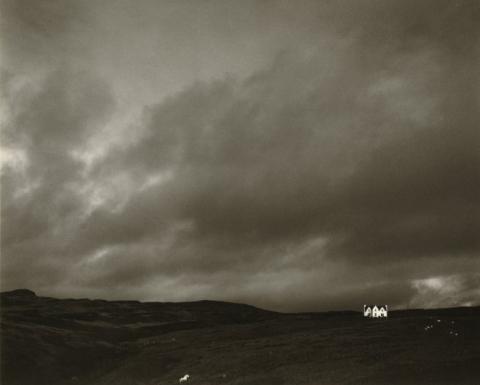
Isle of Skye
Pentti Sammallahti
2008
_______________________
three poems from 'Nights Reading'
Marthe Reed
presented by Jerome Rothenberg
Gazing At Plums
Though the reasonable man does not have doubts, the condition of woman is
perhaps less certain. A question of where
A box of pens, a wooden bowl, desk littered in open books: the uncertain truth of
propositions
Light penetrates the shadow of night jade. A hawk rending the black-flecked back
of a bear. Can we rely on our senses?
A prescription of dialogue. Such talk gets it’s meaning from the correspondence
between doubt and longing
Explanations signal: a book of fables, illustrated herbals. The interchangeable
nature of service and servitude demands precision, the roots, red and potent as
the flowers
Scheherazade’s inventions. She prepares a tisane of chamomile, dried quince
flowers. Though it is not a matter of seeing
An open field, a page of writing. To confirm an hypothesis, again and again
Does she have a body? Married to interrogation, herself predicated on the
firmness of flesh, her teeth tearing through it, the sweetness of its juice
A place she enters into
...(more)
Marthe Reed poems online 1 2 3 4
_______________________
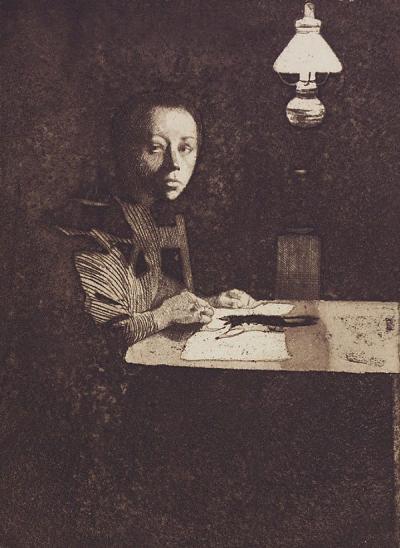
Self-portrait
1893
Käthe Kollwitz
b. July 8, 1867
_______________________
Translations of five poems by Julia Piera
by Forrest Gander
nth position
And so it begins again,
lugging the politics of fear on her shoulders
teeth sweating pure rage
a chest for the fencing of sobs
between garbage, screen,
cumulus succubus of garbage...
the terror with a cursor in its burned little hand
screensavers, multiethnic
"personalized," just for her,
from a white balcony
of grates and pitas
the b. skips,
digital gladiolus
and something immense
plunges
...(more)
_______________________
PAIN.TXT
by Alan Sondheim and Sandy Baldwin
electronic book review
In PAIN.TXT, Alan Sondheim and Sandy Baldwin explore the limitations of expression at the borders of human sensation. Derived from a dialog between Sondheim and Baldwin on extreme pain, this essay considers how one signifies intensity and another attempts to interpret that intensity, and the challenges this process poses for affect, imagination, and ultimately intersubjectivity. In keeping with the content of this piece, the two preserve the dialog format, recreating for readers a discourse on pain that never finds its center.
...(more)
_______________________
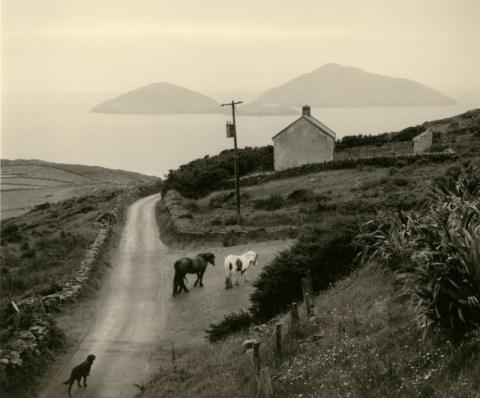
Co. Kerry
Pentti Sammallahti
1978
_______________________
The most brilliant advertising campaign for alienation we’ll ever get to watch has always been us.
The Spectacle is separation perfected.
The Post-Spectacular World, Part 1 Nicholas DeBoer drunken boat
(....)
This spectacular world. The slips of pain in my head are daunting. Fibrous slimy pink hemispheres pulling apart the middle so slowly that I’m feeling every little weave away from me. Wet feet ringing into leather. Sticky, sweaty face.
I keep trying to get intimate with this moment, trying to be intimate. I’ve taken too many drugs into my system. I haven’t felt well for years and who is to blame? How much energy will I waste on crap thinking? How much energy not getting involved in the things I care about? I can type ninety words a minute yet still can’t capture my dumb hick voice. I want to talk about Guy Debord’s The Society of the Spectacle and how it fails.
It fails because it’s been the only feature in the last ten years of my life that has always been stable. I love the Spectacle because I don’t have to worry. I get it, this invisible layer in our communication. All this ongoing pop-mediation-image complex whatever. Hum in the shower of made up show tunes, pitching early Beatles and Rihanna lyrics 7:15am. I got to stay clean, because I’m afraid to smell. I keep asking people if my room smells because I spend so much time in there, hoping to find a job so I can leave it.
A lot of theory has this lazy war tactic, where a term gets defined over and over again as, “this thing is.” It’s a hijacked value, straw poll results. I bet I could string a pretty long line of anal-beads when Debord does it.
So, how can I define it. John Courie, my closest adviser, says it’s in the first chapter in SOS. Separation Perfected. But, I think that’s it right there, the title itself. The urgency of desire is need in children. Desire pools until reaction voids the user.
...(more)
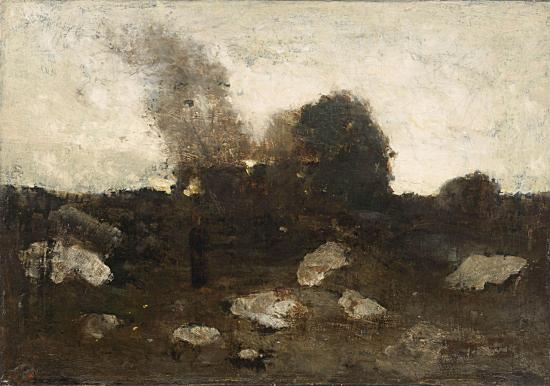
Landscape at Daybreak,
1872
Odilon Redon
d. July 6, 1916
_______________________
1914 versus 1938: how anniversaries make history
Ivan Krastev
(....)
It is arguable that if the fall of the Berlin Wall had not coincided with the bicentennial of the French Revolution, our reading of the changes in Central and Eastern Europe could have been different and what we call revolution today could have been called by another name. And it was this very word “revolution” with all its rich historical connotations that determined the choices of the actors. After 1989 it was the shared fear of revolutionary violence that urged both the old communist elite and the dissidents to opt for negotiations and compromise. It was the shadow of 1789 and the Terror that followed that acted as the invisible presence in Central European politics in the early years of transition.
The power of historical anniversaries is so real that one can also imagine that if a mass political protest erupts in Moscow in the year 2017 (centenary of the Bolshevik revolution), we would be tempted to believe that history has yet again changed its course and our view of what is happening on the streets will be dramatically shaped by the books about Lenin, Stalin and Trotsky that will top the bestsellers lists.
In their classic study, Thinking in Time, American political scientists Richard Neustadt and Ernest May have revealed that the choice of the proper historical comparison is at the heart of any crisis decision-making. Policy makers need history to make sense of the present.
...(more)
_______________________
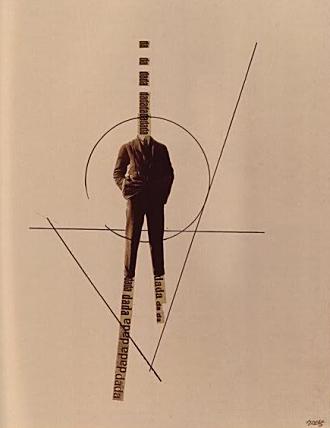
DADA-Bild
1920
George Grosz
d. July 6, 1959
_______________________
Poems by the Baroness Elsa von Freytag-Loringhoven
jacket2
Hell’s Wisdom
My "Derangement" dwells in absence - as - under circumstances existing - normally - it
should be present.
It maintains in circumstance -
There I leave it.
My being in senses right is normal height.
It being uncommon – presents strange - as genius does - uncompanioned.
Victim of circumstance I am not – as I am no dweller in
For me - to be touched - touchably - by circumstance - normal
To vacuous spectres of substance past - should so be abnormal – as to cause revulsion
degree –
Provoking instant insanity – whence I am protected by radius of spiritual emanation
To circumstance I am immaterial - as is circumstance to me.
Diametricaly opposed - alone we leave each other - charmed aloft
Lone I - enhanced shrouded earth – by own atmosphere mine self’s own self – out-of
circumstance cosmic star - volve revolve - evolve -I do - by starshaped pride stygmatized
outcast from circumstanced press - presssure – I am.
...(more)
Dropping the Baroness in the middle
Elsa von Freytag-Loringhoven, Dada dressing, German Arts, and poetry today
Tanya Clement
_______________________
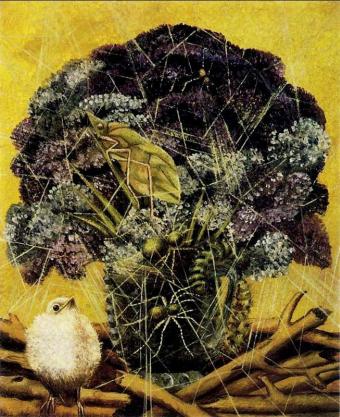
The Chick
1945
Frida Kahlo
b. July 6, 1907
_______________________
The Earthquake In This Case Was
Mary Jo Bang
jubilat
(....)
Blind faith relies on an obedience that verges
on boredom. Any disquiet, however slight, might
define a moment like a character's obsessive cough
might define a character by exploding
when it shouldn't. It keeps exploding just when
it shouldn't and when it does it acts in the story
like a glass box cracked by a hammer that breaks
and becomes a broken box. In both situations,
action releases the stale air encased there.
...(more)
_______________________
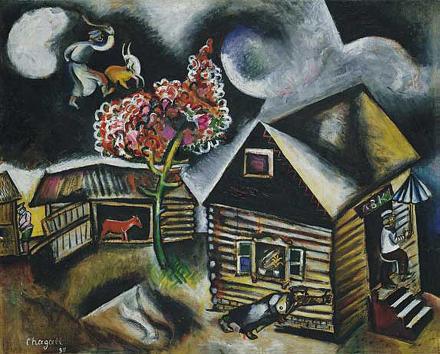
Rain
1911
Marc Chagall
b. July 6, 1887
_______________________
A silhouette of itself: Taipei by Tao Lin
Stephen Mitchelmore
This Space
(....)
Recently I suggested the reason why the works of Marcel Proust and Karl Ove Knausgaard maintain a fascination with readers is not due to the extreme length of their books or similarities in subject matter but instead the ambiguity of their genre: both are presented as novels yet are so closely aligned to the reality of the authors' own lives that we read them more aware of everyday mystery and chance than in a traditional memoir, and far more so than in 'gritty' realism. While the coy name change moves Taipei closer to Roth/Zuckerman territory than to the same-name first person of Proust and Knausgaard, this is a necessary function of the condition of interchangeable signs without meaning from which the novel emerges: Paul is barely himself, and it is no joke. So while Taipei might not gain the aura of Proust and Knausgaard, it shares their struggle.
...(more)
_______________________
A Poem
Wislawa Szymborska
Translated from the Polish by Clare Cavanagh
Nothingness unseamed itself for me too.
It turned itself wrong side out.
How on earth did I end up here—
head to toe among the planets,
without a clue how I used not to be.
...(more)
_______________________
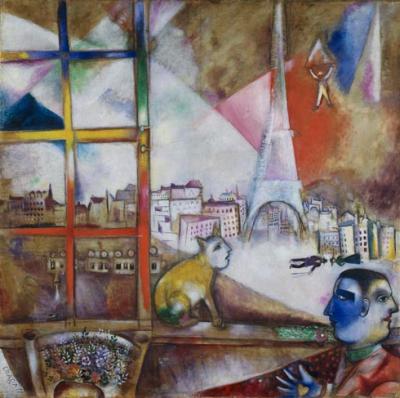
Paris Through the Window
1913
Marc Chagall
_______________________

photo - mw
_______________________
How can they write and believe? (PoemTalk #78)
Muriel Rukeyser, 'Ballad of Orange and Grape'
Ballad of Orange and Grape
Muriel Rukeyser
(1973)
After you finish your work
after you do your day
after you've read your reading
after you've written your say --
you do down the street to the hot dog stand,
one block down and across the way.
On a blistering afternoon in East Harlem in the twentieth century.
Most of the windows are boarded up,
the rats run out of a sack --
sticking out of the crummy garage
one shiny long Cadillac;
at the glass door of the drug-addiction center,
a man who'd like to break your back.
But here's a brown woman with a little girl dressed in rose and pink, too.
Frankfurters frankfurters sizzle on the steel
where the hot-dog man leans --
nothing else on the counter
but the usual two machines,
the grape one, empty, and the orange one, empty,
I face him in between.
A black boy comes along, looks at the hot dogs, goes on walking.
I watch the man as he stands and pours
in the familiar shape
bright purple in the one marked ORANGE
orange in the one marked GRAPE,
the grape drink in the machine marked ORANGE
and orange drink in the GRAPE.
Just the one word large and clear, unmistakable, on each machine.
I ask him: How can we go on reading
and make sense out of what we read? --
How can they write and believe what they're writing,
the young ones across the street,
while you go on pouring grape into ORANGE
and orange into the one marked GRAPE -- ?
(How are we going to believe what we read and we write and
we hear and we say and we do?)
He looks at the two machines and he smiles
and he shrugs and smiles and pours again.
It could be violence and nonviolence
it could be white and black women and men
it could be war and peace or any
binary system, love and hate, enemy, friend.
Yes and no, be and not-be, what we do and what we don't do.
On a corner in East Harlem
garbage, reading, a deep smile, rape,
forgetfullness, a hot street of murder,
misery, withered hope,
a man keeps pouring grape into ORANGE
and orange into the one marked GRAPE,
pouring orange into GRAPE and grape into ORANGE forever.
Muriel Rukeyser reads The Ballad of Orange and Grape.
_______________________
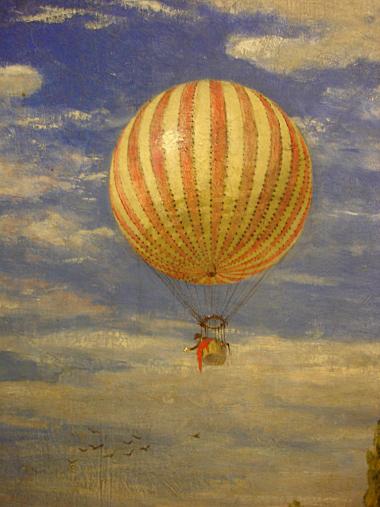
The Balloon
1878
Pál Szinyei Merse
b. July 4, 1845
_______________________
Against Mastery
Wilfred M. McClay
The Hedgehog Review: Vol. 16 No. 1 (Spring 2014)
(....)
How, for one, will we make sense of death if it comes to be viewed as something with no intrinsic meaning, but chiefly as a piece of bad luck, a matter of bad timing—the misfortune, for example, of contracting the disease before the march of inevitable medical progress had caught up with it? Or worse, how can we ever be reconciled to death when it becomes understood as something almost entirely accidental, and largely preventable?
Do we imagine that complete control over our biological fates will necessarily make us happier? Perhaps it will. But one can as easily imagine that there might be little room for uninhibited joy or exuberance in such a world. More likely it will be a tightly wound world, saturated with bitterness and anxiety and mutual suspicion, in which life and health will be guarded with all the ferocity of Ebenezer Scrooge guarding his money. Growing mastery means growing responsibility, and the need to assign blame, since nothing happens by chance. Some of the blame will be directed at the parents, politicians, doctors, and celebrities who make plausible villains, or conspiracy theories that explain why someone else is always at fault. But much of the blame will devolve upon ourselves, since in being set free to choose so much about our lives, we will have no one else to blame when we make a complete mess of things.
No, there is good reason to fear that the more our lives are prolonged and powers extended, and the more death becomes seen as an avoidable evil whose precise moment should be “chosen,” rather than an inherent feature of human life, the more common it will be to encounter people who live imprisoned by their fear of all risk, since the possible consequences of any risk will seem too vast, too horrible, and too fully avoidable, to be contemplated.
...(more)
_______________________
Advances in Internet of Things
Personal Perspectives: Individual Privacy in the IOT
ABSTRACT
The Internet of Things (IOT) is the extension of the Internet to the next level, i.e., bringing the Internet to the real physical world of things. In this research, 22 people working with different aspects of IOT development were interviewed in Finland and in China, in order to investigate their thoughts and personal opinions on the IOT and the individual privacy in the IOT. This paper presents the background of the IOT, interviews and collected answers, as well as highlights of collected free comments.
_______________________

photo - mw
_______________________
Autism, sociality, and human nature
Gregory Hollin
... over the past thirty years autism has become an all-pervasive cultural experience. ‘Autistic fiction’, for example, has become a recognised genre. And when I talk of ‘autism fiction’, think not only of Rain Man and The Curious Incident of the Dog in the Night-Time but of all those times that autism is used as a ‘prop’ or ‘prosthetic device’ to explore humanity in toto. Just last week I found myself watching The Machine, a dystopian film in which badly brain-damaged war veterans have computer chips implanted into their brains with the aim of allowing them to return to ‘normal functioning’ (read: become super-soldiers). As you might imagine, this experiment does not end well. What I find particularly interesting, however, is the manner in which these scientists come to realise that these militarised cyborgs are less than human: they fail the Sally-Anne Test, one of the oldest psychological tests for autism. ‘Facts are just facts’ says Paul the cyborg, unable to grasp that the world could appear different to a second person. And so it is within The Machine: as with a great deal of fiction (and, as I’ll argue below, within particular academic disciplines) what is missing in autism is taken to reveal something fundamental about what needs to be present in order to be human.
How did this situation occur? How did autism which, until quite recently, was an unusual diagnosis of little broader concern, come to hold a central place in debates over human nature? That’s what I’d like to think about in this essay. My argument, in short, is that the thing which is ‘missing’ in autism, crudely put, is assumed to be social functioning and this is crucial when it comes to understanding why autism is taken to be so important for the human.
...(more)
Somatosphere Science, Medicine, and Anthropology via Kenan Malik
_______________________

photo - mw
_______________________
Manipulus vocabulorum,
A dictionary of English and Latin words,
arranged in the alphabetical order of the last syllables by Peter Levins.
First printed A.D. 1570
A facsimile edition from 1867 of the very first rhyming dictionary, produced by Peter Levins in 1570
via public domain review
_______________________
The city wears a slouch hat (1942)
A Radio Play
John Cage & Kenneth Patchen
ubuweb
The city wears a slouch hat is one of those Cage works that many know about, but few have actually heard. Commissioned by CBS' "Columbia Workshop" to accompany a radio play by "Beat" poet/writer Kenneth Patchen--a surreal script centered around a mysterious drifter known as "The Voice" and his encounters with various characters of the urban landscape. Cage's music aptly fits Patchen's texts, scored for "sound orchestra" of 5 percussionists along with live and recorded sound effects, revealing Cage's gift for orchestrating the timbres of percussion. One can only imagine what unsuspecting families, seated around the radio for an evening's entertainment, made of this bizarre script and rambunctious music in 1942!
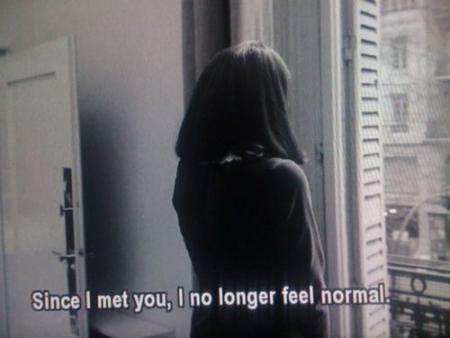
Jean-Luc Godard's Alphaville
long pause, romantic music, silence
Laura Legge
3:am
(....)
The goal of subtitles is clear: to cross linguistic and auditory barriers. And to achieve this objective the subtitler must not only translate between languages, but she must convert between entirely separate media. Spoken language is transformed into written text, the difference between apples and sliced apples. If, at the laser-lit karaoke bar, someone is singing viking metal or bachelor pad pop in a language you do not understand, the lyrics on screen are clearly a separate unit from the words being sung. But still they work to float the observer through what might otherwise be an experience of estrangement, or at least one lacking pleasure.
...(more)
_______________________
An Empty Street
Jeffrey Wainwright
After Ottone Rosai, Via San Leonardo
(....)
***
What is there to an empty street?
Have you seized it
for your melancholy,
shushed and deterred
all would-be passers-by,
your neighbours,
even understanding friends,
emptied them out
like plums from a paper bag
and then folded
and re-creased it
as you have it now?
***
What is there to an empty street
that you will not let it go?
There is no blood,
robbery or impiety
open to the view,
no spectacles required
to see what can be seen,
not even, for certain,
what I’ve called your melancholy.
So you leave me here,
just as you meant to do,
watching the street.
***
...(more)
_______________________
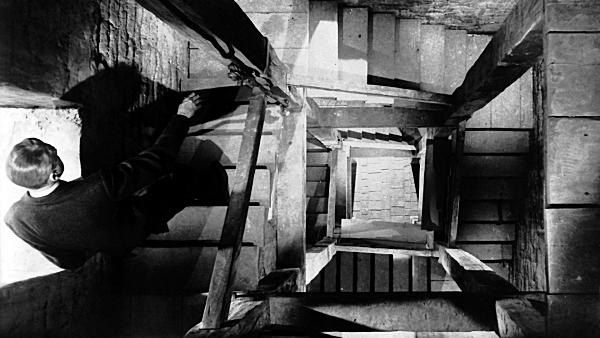
Vertigo
Hitchcock
photo by Eva Besnyö via
_______________________
When it comes to the Internet, we're dealing with a garden of infinite acreage being tilled by millions of gardeners, most of whom are too busy adding to the vegetation to spend any time pulling out weeds. In effect, what we have on our hands is a piece of technology with the potential to radically expand our access to the past-which sounds great, until you think about how much past there is, and what lies there.
The case for an absent-minded InternetWe've built a huge memory machine whose capacity is becoming at best a nuisance, at worst dangerous. Meet the thinkers trying to teach the Internet to forget.
Leon Neyfakh
(....)To a world obsessed with memory—whether measured in gigabytes or in standardized test scores—the idea that forgetting could be a virtue does not come naturally. Having a powerful memory tends to make people seem smarter, better at their jobs, and more fun to talk to; they know more facts about the world and make their friends feel good by remembering little details about their lives. Above all, it’s hard to shake the intuition that retaining more of our experiences, and being able to go over them in our heads long after we’ve had them, makes for a richer, more engaged life.
Forgetting, on the other hand, usually feels like failure: Not only is it incredibly frustrating to find yourself unable to recall something you used to know, it can also be a genuine handicap in life, especially if it becomes chronic. For this reason, we tend to overlook the ways in which acts of forgetting, broadly speaking, help society function. The legal system, for instance, is designed to “forget” the crimes of children in the interest of giving them a chance to start from scratch as adults. Family life is predicated on the ability of the people involved to forget inevitable moments of discord that would otherwise eat away at any bond. Trauma victims, as well, must work to put painful memories behind them in order to not be haunted by the past.
Forgetting is also increasingly being described by psychologists as key to human cognition. ...(more)
_______________________
Reflections on e-slavement
Andrew Mitchell Davenport
full stop
I looked down the aisles, and saw all of the travelers plugged-in and watching films or television on their touchscreens, too. They were watching “Keeping Up With the Kardashians”, a World Cup match, and SportsCenter. My 85 year old grandmother had her earbuds in, too, watching the news. I thought of the word “digital” and how it really means to touch.
_______________________
Poem to the One in Far-Off Lands
Juan Carlos Mestre
Translated from Spanish by Jeremy Paden
The one banished by poverty
lives heartless in far-off lands
and cares for nothing as if it were his
and is sullen and tired under the heavens.
The one who leaves his house defeated
and is dragged along by the murmur of people
and empty wanders the street
and sits in front of a machine.
The one grieved by reason who faces a life
that dies still hoping and does not return.
To this one whom no one ever bade farewell
and who one day takes the train toward dawn.
No one will know him, his story is sad
like a sea that lies undiscovered.
He has not wanted to look at spring,
he works in order to return, to germinate
one day like the flowering tree that in his orchard
gave shade and purpose to morning.
You might think heaven will forgive him,
think love,
city and birds and towers
will peal again the bells in his eyes.
But he, who lost in far-off lands
was boulevard debris, has died.
Mourn him not,
next to that dark wood
bubbled an honest spring.
Words without Borders July 2014: Migrant Labor
_______________________
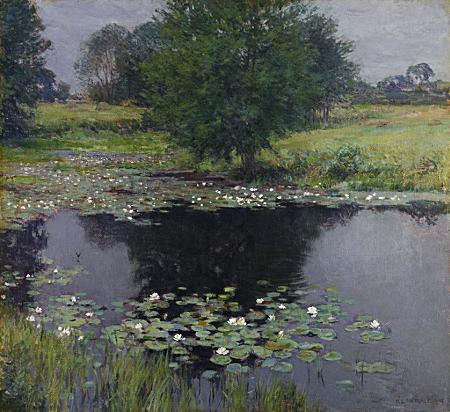
Willard Leroy Metcalf
b. July 1, 1858
_______________________
Dynamics of inequality
A conversation with Thomas Piketty
Translation by Trista Selous
(....)
I regard myself as a social scientist as much as an economist. When you're studying questions such as the distribution of wealth, the boundaries are fluid and approaches must of necessity be combined. After finishing my doctorate at the Ecole normale supérieure I spent the early 1990s in the United States, teaching at MIT and elsewhere, and was very struck by the self-satisfaction of economists in the universities there. They were convinced that their methods were far more scientific than those of their colleagues in the so-called "soft" sciences such as sociology, history, anthropology. But their "science" was often highly ideological.
Since the fall of the Berlin Wall, economists have played a major part in the idealization of the market, in the United States and around the world. Despite my scientific background, I have always been drawn to history. From the outset I tried to gather data on the historical evolution of wealth distribution, because there was very little around. Contrary to what you sometimes hear, historical data do exist, you just have to take the time to gather them, for example by going to the Ministry of Finance archives or the probate records. I have nothing against theory, but it must be used sparingly: a small amount of theory can explain many facts. But most of the time economists do the opposite. They fill the air with theories, giving themselves the illusion of being scientific, though the factual basis for them may be extremely fragile.
...(more)
_______________________
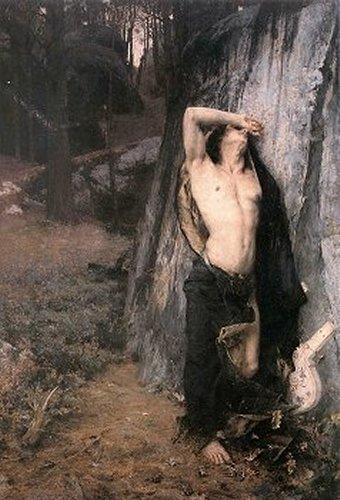
The Lament of Orpheus
1876
Pascal-Adolphe-Jean Dagnan-Bouveret
d. July 3, 1929
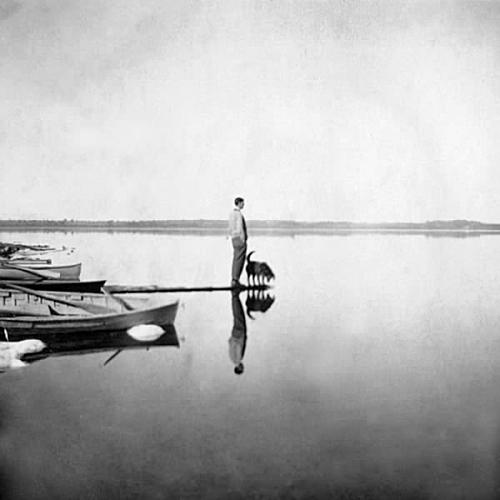
Tom Thomson
at Lake Scugog
photo by T.H. Martin
happy canada day
_______________________
The Perfect Mango [pdf]
Erin Manning
These words are written on my body. They are twenty-five-year-old words and sometimes they have lived a thousand years. I have been waiting to write this book, waiting all my life for it to stop long enough so that I can transpose these words aching, marking, devouring me. Today I write my body.
I know I have written this before, that it has been written before me and in the thousand years and twenty-five I will write it many more times. Today I write my story, written among the maze of paint and vomit that is my life today, a story of love and desire and fear and weakness.
Often I wonder whether my teeth are rotting. Is that the mark of my story on my body? My story ravages my body every time I try to read it, exposing the traces of time left behind, the unfinished fantasies and dreams come true.
(....)
Once I wrote another book. It was about a sea that disappeared, about a boy who believed in a beautiful purple sea, about parents who didn't see, about a sea that disappeared. There were pictures as well, painted in watercolour. I don't have the book anymore. It was stolen. Perhaps it is the mark on my left thigh, the one that looks like cellulite. It's not cellulite at all. It's my lost story, waiting to be read again. But I can't read it because everytime I open a magazine I read about the new magical cure to eliminate cellulite. They don't want to read my book. They want to unwrite the writing on my body and make me whole again. They want to polish me up and make me smooth, nice to look at, appealing and unthreatening. In my book the sea disappeared because they couldn't see. Perhaps my book was smeared by their creams and not stolen at all. Perhaps they will make this one invisible with their magic wrinkle creams. This book is full of wrinkles.
(....)
What story can I tell you that is my own? What story can I tell you without losing my body as I borrow the writing from it? What will you do with my story once it is told? Will you iron it out as well? Do you like my story?
I would like to write a love story, a story about love. It would be easier to write if I had purged everything but it's hard to throw up today. I would like to tell you a love story and I promise to tell it with a happy ending. I promise not to talk too much about throwing up. I promise not to make you uncomfortable. I promise not to tell.
(....)
What Can The Body Do?
Conversation recorded with Erin Manning in New York on January 19, 2014.
_______________________

Parque das Caldas da Rainha
Portugal
Landscape architecture by Francisco Caldeira Cabral
photo by Manuel Silveira Ramos
Fernando Pessoa: The falling of leaves that one senses without hearing them fall
presented by Tom Clark
Beyond the Pale
(....)
To cease, to be unknown and external, the stirring of branches in remote avenues, the tenuous falling of leaves that one senses without hearing them fall, the subtle sea of distant fountains, and the whole indistinct world of gardens at night, lost in endless complexities, the natural labyrinths of the dark!
To cease, to end once and for all, yet to survive in another form, as the page of a book, a loose lock of hair, a swaying creeper outside a half-open window, insignificant footsteps on the fine gravel curve of a path, the last twist of smoke high above a village as it falls asleep, the idle whip of the waggoner stopped by the road in the morning... Absurdity, confusion, extinction -- anything but life...
(....)
Such is the law by which things that can’t be explained must be forgotten. The visible world goes on as usual in the broad daylight. Otherness watches us from the shadows.
...(more)
Fernando Pessoa,The Book of Disquiet,translation by Margaret Jull Costa,
_______________________
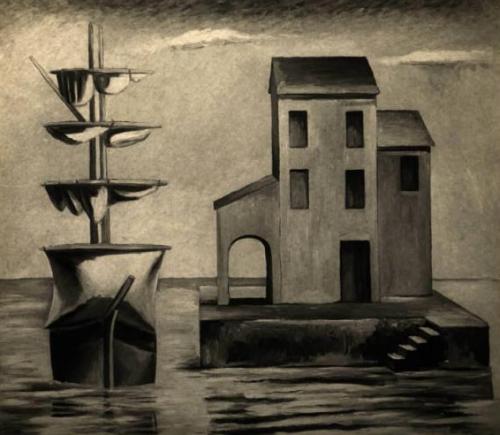
Alberto Magnelli
b. July 1, 1888
_______________________
The Pragmatist Skepsis as a Social Practice. [pdf]
Skepticism, Irony and Cultural Politics in Rorty’s Philosophy
Olivier Tinland
Symposia. Pragmatism and the Social Dimension of Doubt: Fresh Perspectives
European Journal of Pragmatism and American Philosophy
Volume 5, Number 2, 2013
_______________________
A Taste Of Empty Ideas
Peter Unger
(....)
A central thesis of the book, perhaps its most central thesis, is this: Contrary to what has been supposed by Anglophone academic philosophers, during the last five decades, there has been offered hardly any new thoughts whose truth, or whose untruth, makes or means any difference as to how anything ever is as concern concrete reality, except for ever so many perfectly parochial thoughts, ideas about nothing much more than which words are used by which people, and how various of these people use these words of theirs — and nothing any deeper than that. (And, if it be required that the newly offered non-parochial thoughts be credible idea – at least more credible than their negations, or their denials, then what’s been relevantly placed on offer, in all these years, goes from hardly anything to nothing at all.) Rather, even while brilliant thinkers have offered thoughts meant to cut lots of concrete mustard, what’s been newly placed on offer, with any credibility, are just so many thoughts empty of import for concrete reality, that is, just so many concretely empty ideas. And, each of these concretely empty ideas owes its emptiness to its being analytic, in a useful sense of that term, so, what’s more, each of the offered thoughts are thoughts that, at least when correct, are just so many analytically empty ideas, each on a par with, in that way, the thought that someone can remember her old college days only if she went to college.
...(more)
Empty Ideas: A Critique of Analytic Philosophy Peter Unger amazon
Interview With Peter Unger
by Grace Boey
_______________________
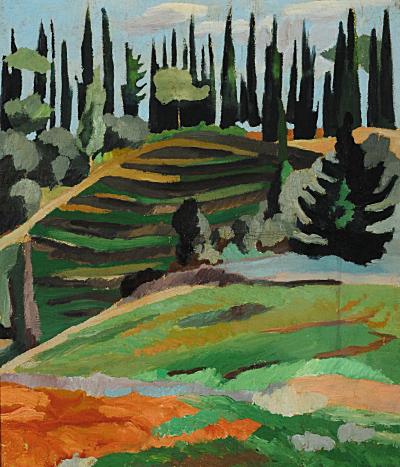
Alberto Magnelli
_______________________
Words without Borders July 2014: Migrant Labor
This month we present writing about migrant labor. Through official channels or underground networks, fleeing poverty or chasing dreams, the characters here leave their homelands in search of work and new lives, finding nothing is quite as they expected. Bulgarian journalist Martin Karbovski harvests cucumbers and comedy. Christos Ikonomou's sorrowful Greeks watch their world slip away. Journalist Wang Bang interviews Chinese prostitutes in a shadowy London, and Russian graphic artist Victoria Lomasko documents modern slavery in Moscow. Taleb Alrefai learns the hidden cost of a work permit. In Paris, Wilfried N'Sondé takes the temperature of a simmering banlieue. Vladimir Vertlib sees Russia recreated in Brighton Beach. Saud Alsanousi, the winner of the 2013 International Prize for Arabic Fiction, portrays a mixed-blood Kuwaiti victimized by that country's harsh immigration policies, while Bangladesh's Shahaduz Zaman's visa applicant endures medical tests and examines his own emotions. Mely Kiyak observes Turkish immigrants in Germany, and Juan Carlos Mestre mourns a worker who never returned. Elsewhere, Musharraf Ali Farooqi introduces and translates a group of Sindhi folk tales.
|
